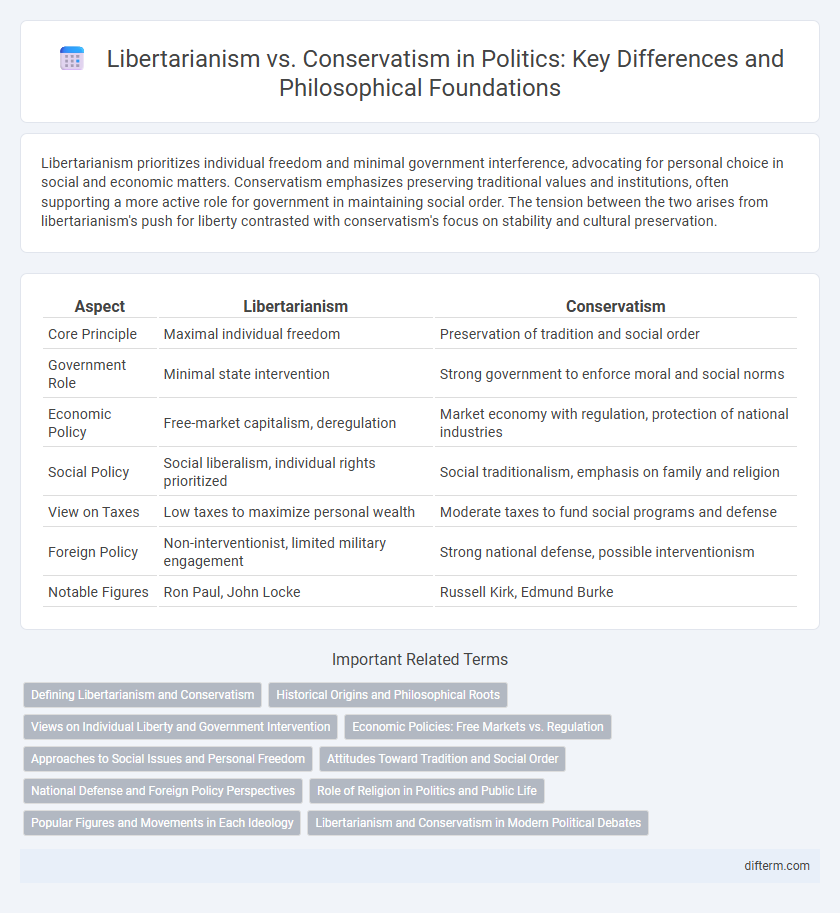Libertarianism prioritizes individual freedom and minimal government interference, advocating for personal choice in social and economic matters. Conservatism emphasizes preserving traditional values and institutions, often supporting a more active role for government in maintaining social order. The tension between the two arises from libertarianism's push for liberty contrasted with conservatism's focus on stability and cultural preservation.
Table of Comparison
| Aspect | Libertarianism | Conservatism |
|---|---|---|
| Core Principle | Maximal individual freedom | Preservation of tradition and social order |
| Government Role | Minimal state intervention | Strong government to enforce moral and social norms |
| Economic Policy | Free-market capitalism, deregulation | Market economy with regulation, protection of national industries |
| Social Policy | Social liberalism, individual rights prioritized | Social traditionalism, emphasis on family and religion |
| View on Taxes | Low taxes to maximize personal wealth | Moderate taxes to fund social programs and defense |
| Foreign Policy | Non-interventionist, limited military engagement | Strong national defense, possible interventionism |
| Notable Figures | Ron Paul, John Locke | Russell Kirk, Edmund Burke |
Defining Libertarianism and Conservatism
Libertarianism advocates for minimal government intervention, emphasizing individual liberty, free markets, and personal responsibility as core principles. Conservatism prioritizes tradition, social order, and a cautious approach to change, often supporting government roles in upholding cultural values and national stability. The ideological divide centers on the extent of government involvement in both economic and social spheres, with libertarians favoring limited state power and conservatives endorsing selective governance to preserve societal norms.
Historical Origins and Philosophical Roots
Libertarianism traces its historical origins to classical liberal thinkers like John Locke and Adam Smith, emphasizing individual liberty, limited government, and free markets. Conservatism, rooted in Edmund Burke's reaction to the French Revolution, prioritizes tradition, social order, and gradual change to preserve established institutions. The philosophical divide centers on libertarianism's focus on personal autonomy versus conservatism's emphasis on collective stability and moral continuity.
Views on Individual Liberty and Government Intervention
Libertarianism emphasizes maximal individual liberty with minimal government intervention, advocating for personal freedom in both economic and social spheres. Conservatism supports limited government but prioritizes order, tradition, and social stability, often endorsing intervention to uphold moral values and national security. Both ideologies value freedom but diverge significantly on the scope and role of government in regulating individual behavior and economic activities.
Economic Policies: Free Markets vs. Regulation
Libertarianism champions free markets with minimal government intervention, emphasizing individual economic freedom and limiting regulations to foster entrepreneurship and innovation. Conservatism supports market economies but often endorses regulatory measures to protect traditional industries, maintain social order, and address economic inequalities. Both ideologies value economic growth, but libertarianism stresses deregulation, while conservatism balances market freedom with strategic government oversight.
Approaches to Social Issues and Personal Freedom
Libertarianism advocates for minimal government intervention in social issues, emphasizing individual autonomy and personal freedom as fundamental rights. Conservatism often supports traditional social norms and may endorse government policies that uphold established moral values to preserve social order. The contrast lies in libertarianism prioritizing personal choice above all, while conservatism balances freedom with communal and cultural stability.
Attitudes Toward Tradition and Social Order
Libertarianism emphasizes individual freedom and minimal government intervention, often challenging traditional social hierarchies and conservative norms. Conservatism prioritizes preserving established traditions and social structures, advocating for stability and continuity in cultural values. The fundamental divergence lies in libertarianism's focus on personal autonomy versus conservatism's commitment to maintaining social order through tradition.
National Defense and Foreign Policy Perspectives
Libertarianism emphasizes minimal government intervention, advocating for a reduced military footprint and non-interventionist foreign policies that prioritize diplomacy and respect for national sovereignty. Conservatism supports a strong national defense with robust military capabilities, endorsing proactive measures to protect national interests and maintain global influence. These divergent views reflect fundamental differences in balancing security priorities with individual freedoms and international engagement strategies.
Role of Religion in Politics and Public Life
Libertarianism advocates for a strict separation of religion and state, emphasizing individual freedom and limited government intervention in both religious and political matters. Conservatism often supports the integration of religious values into public policy, highlighting tradition and moral order as guiding principles for legislation and social norms. The role of religion in politics serves as a key differentiator, with libertarians promoting secular governance and conservatives endorsing faith-informed decision-making.
Popular Figures and Movements in Each Ideology
Libertarianism champions figures like Ron Paul and movements such as the Reason Foundation, emphasizing individual liberty and minimal government interference. Conservatism rallies around leaders like Ronald Reagan and organizations like the Heritage Foundation, prioritizing traditional values and national security. Both ideologies influence policy debates but diverge sharply on the role of government and social issues.
Libertarianism and Conservatism in Modern Political Debates
Libertarianism emphasizes individual liberty, minimal government intervention, and free-market principles, often advocating for civil liberties and non-interventionist foreign policies. Conservatism prioritizes tradition, social stability, and a limited but structured government role to preserve cultural values and national security. Modern political debates highlight tensions between libertarian calls for personal freedom and conservative emphasis on social order and institutional preservation.
libertarianism vs conservatism Infographic

 difterm.com
difterm.com